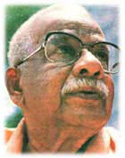Thikkurussi Sukumaran Nair
| Thikkurissy Sukumaran Nair തിക്കുറിശ്ശി സുകുമാരൻ നായർ |
|
|---|---|
 |
|
| Born |
Sukumaran Nair 16 October 1916 Thikkurissy, Travancore |
| Died | 11 March 1997 (aged 80) Thiruvananthapuram, Kerala, India |
| Occupation | Actor, Director, Producer |
| Years active | 1950–1997 |
| Spouse(s) | Sarojini Kunjamma, Ambalapuzha Meenakshy Amma, K. Sulochana Devi |
| Children | Shyamala Devi Kunjamma, Geetha Devi Kunjamma, Rajahamsan, Kanakasree |
| Parent(s) | Mangat C. Govinda Pillai, N. Lekshmi Amma |
| Website | http://www.thikkurissy.com |
Thikkurissy Sukumaran Nair (Malayalam: തിക്കുറിശ്ശി സുകുമാരൻ നായർ; 16 October 1916 – 11 March 1997) was a Nagercoil born Malayali Indian poet, playwright, script writer, lyricist, orator, film director and actor, though he is best known as an actor in Malayalam cinema. He is the recipient of Padmashri from the Government of India, which is one of the highest civilian honours in India. In a career that spanned about 47 years, he acted in over 700 films. He is considered to be the first movie star in Malayalam cinema.
Sukumaran Nair was born on 16 October 1916 in the village of Thikkurissy, Nagercoil, then part of Travancore. The village of Thikkurissy is now in Nanchilnadu, Nagercoil, Kanyakumari district, Tamil Nadu. He was born in an aristocratic Nair family to Mangat C. Govinda Pillai and N. Lekshmi Amma. He was a good writer and an orator even when he was doing his schooling in Marthanda Varma School. He wrote his first poem at the age of 8 and his poem was published for the first time when he was 14 in Dhakshina Bharathi. His poems were collectively published as a book named Kedavilakku when he was 20. His parents wanted him to secure a government job, but he launched his career in writing and arts even before he completed his studies. Incidentally, his sister L. Omanakkunjamma was the first female magistrate in India.
He launched his career as a playwright. His plays Mareechika and Kalakaran were hugely successful. He then went on to write three more—Sthree, Maya and Sariyo Thetto—that revolutionised the professional play scenario in Malayalam. He replaced the melodramatic romantic musicals, which ruled the roost till then, with dialogue centred prose plays having themes of realism and social importance.
...
Wikipedia
